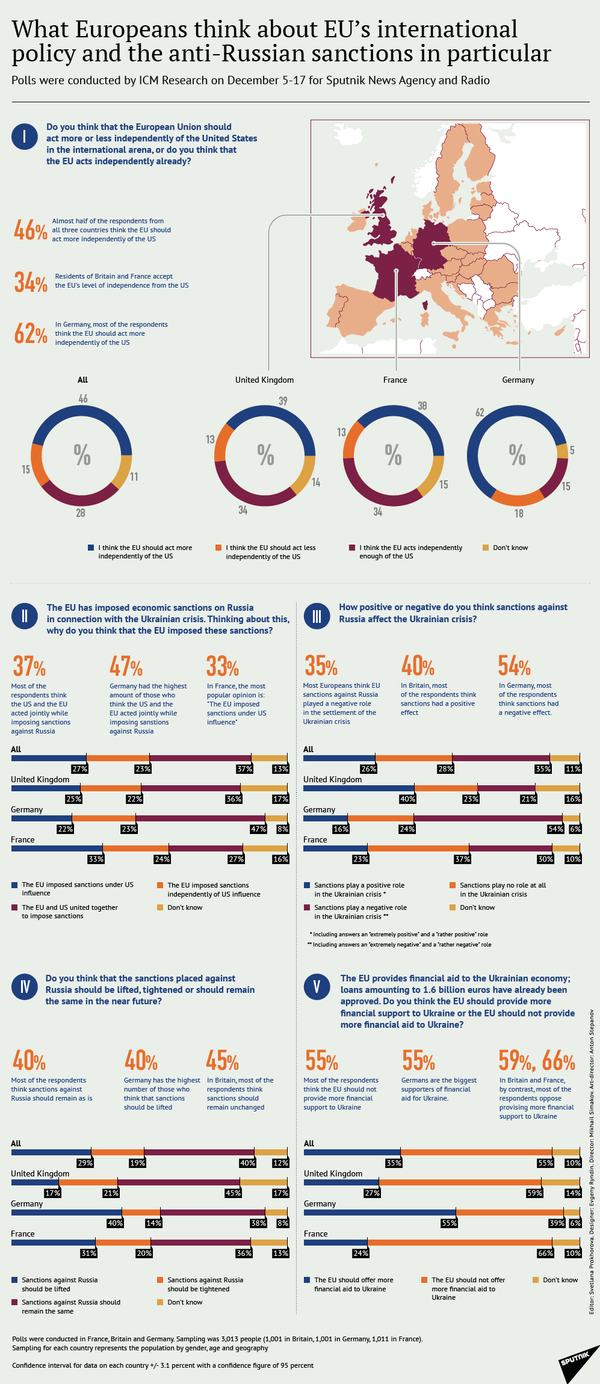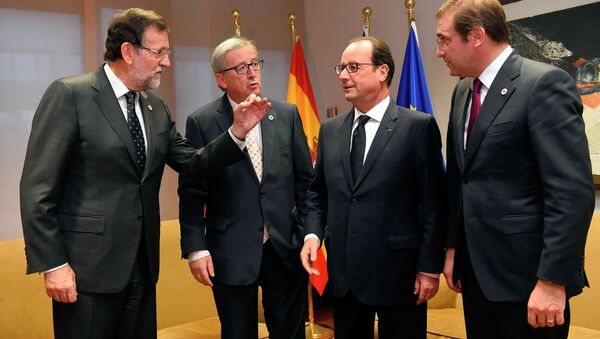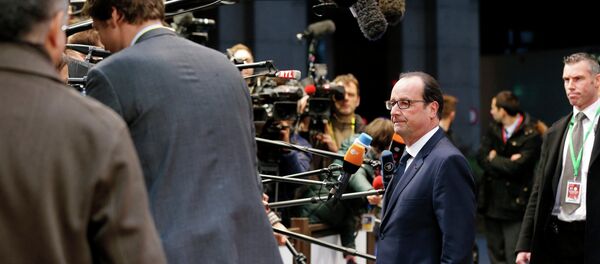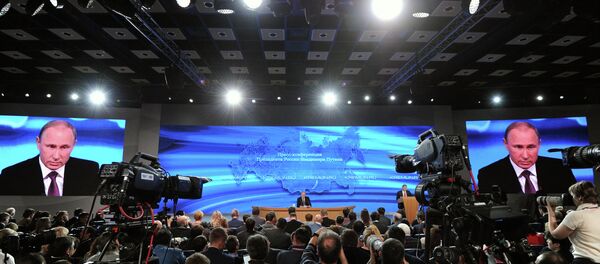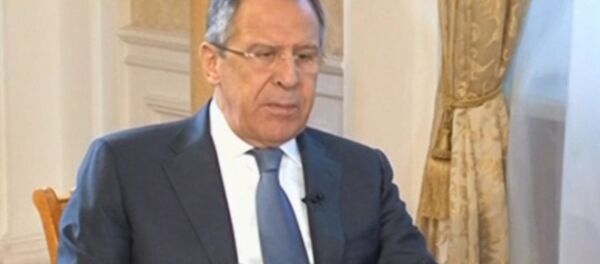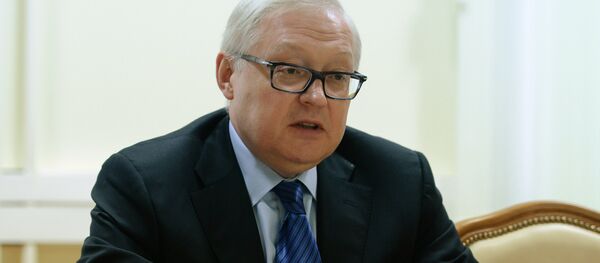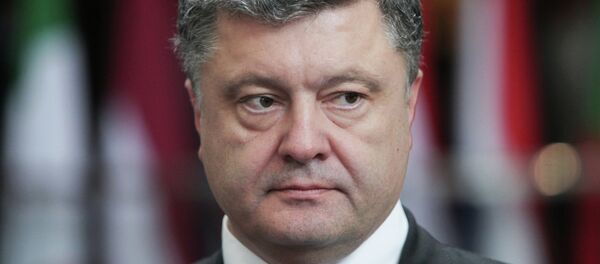The ICM Research questioned over 3,000 people in Germany, the United Kingdom, and France. Telephone interviews with adults in the three countries were conducted in December 2014.
According to the poll, the vast majority of German citizens, 62 percent, think that Brussels should become more independent from Washington, while only 15 percent of Germans believe that the European Union has already been acting independently enough from the United States.
The European Union coordinates most of its foreign activities with the United States, including the recently imposed sanctions against Russia over Moscow’s alleged interference in Ukraine’s internal affairs – a claim the Kremlin has repeatedly denied. The sanctions particularly targeted Russia's energy, defense and banking sectors. Economic sanctions imposed in July were preceded by several rounds of restrictions imposed by the EU, the US and their allies against Russian and Crimean officials and individuals that Brussels believed to have played a role in "destabilizing" Ukraine.
A lot of EU citizens, particularly Germans, whose businesses and work depend on cooperation with Russia, expressed their dissatisfaction over their governments’ actions, saying that they have blindly followed US policies.
Have Anti-Russian Sanctions Been Implemented by EU Under US Influence, Jointly, or Independently?
Another 37 percent of EU residents said that the European Union and the United States had acted together when imposing anti-Russian sanctions, while in Germany 47 percent of respondents thought that Washington and Berlin had taken the decision jointly.
In France, 33 percent of those polled argued that the United States had influenced the bloc’s decision to join the sanctions against Russia, while only 24 percent said that the European Union had maken the decision independently.
In the United Kingdom, 17 percent expressed no opinion, while a quarter of the respondents said the European Union’s decision was affected by Washington.
Have Sanctions Against Russia Affected the Ukrainian Conflict Settlement in Positive or in Negative Way?
Only 16 percent of German citizens thought the sanctions had affected the situation positively, while 24 percent said the measures had no effect at all.
British residents polled had a completely different opinion. Forty percent of British respondents said that sanctions had positively affected the situation in Ukraine, while only 21 percent argued that the impact had been negative.
Thirty-seven percent of French citizens claimed that anti-Russian sanctions had played no role in the Ukrainian crisis settlement, and 30 percent said the measures had played a negative role.
Overall, 35 percent of Europeans said sanctions had had a negative impact on the Ukrainian crisis settlement, while 26 percent had expressed opposite opinion.
Should Sanctions Against Russia Stay in Place?
Another 29 percent of respondents in Germany, the UK and France said that anti-Russian sanctions should be cancelled, while only 19 percent thought that sanctions should be tightened.
According to the poll results, 40 percent of German citizens – the highest number among the three countries – believed that the sanctions against Russia should be lifted. Only 14 percent of Germans said that additional restrictive measures should be imposed against Russia.
Forty-five percent of people in the United Kingdom, and thirty-six percent in France argued that the anti-Russian sanctions should remain, twenty-one and twenty percent respectively in the two countries said extra sanctions must be implemented.
Should EU Provide Further Financial Assistance to Ukraine?
The question ICM Research put to respondents was as follows: “The EU provides financial assistance to the Ukraine’s economy, and the total amount of already approved credits equals 1.6 billion Euros. In your opinion, should the EU provide further economic aid to Ukraine, or shouldn’t it allocate more funds to this country?”
Only 35 percent of the respondents said that the bloc should allocate extra funds to Ukraine, and 10 percent had no opinion on the issue.
Germans, in contrary, said that the country should allocate more financial aid to Ukraine. Fifty-five percent of respondents in that country shared this opinion, while 39 percent argued that the country should not provide more financial aid.
As a result of the internal conflict in Ukraine, which erupted after Kiev launched a military operation against eastern Ukrainian independence supporters who refused to recognize the new government they believe to had seized power after a February coup, the country’s economy is now struggling. In an attempt to achieve the economic recovery, Kiev authorities have asked for international loans.
Earlier this year, the European Union adopted two Macro-Financial Assistance (MFA) programs of approximately 1.61 billion Euros ($2 billion) for Ukraine. The loans were intended to support Ukraine economically and financially, while encouraging structural reforms in the country.
